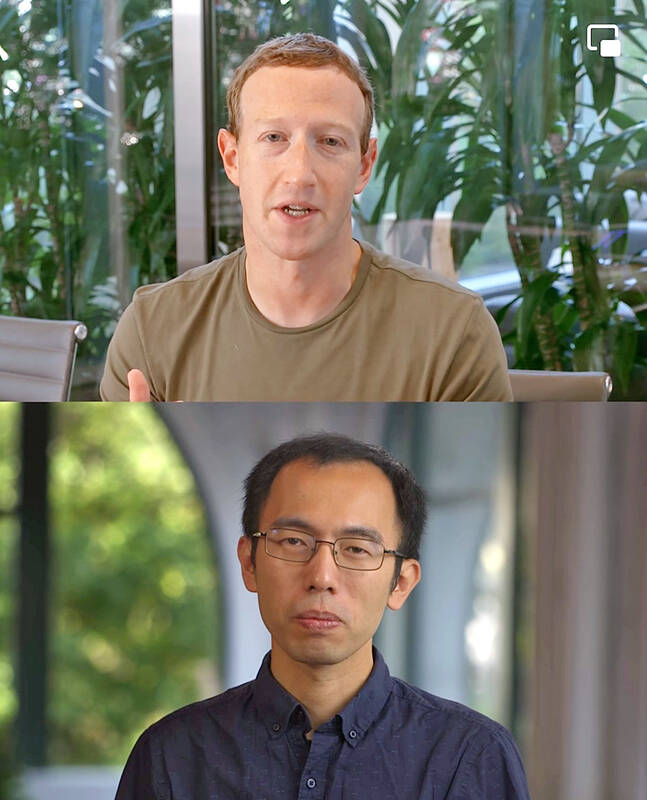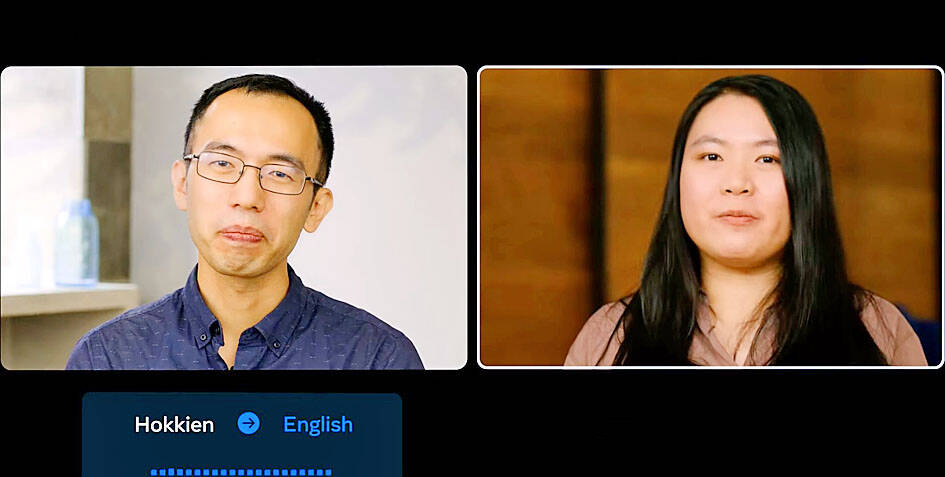Meta Platforms on Wednesday said it has built an artificial intelligence (AI) system that translates Hoklo into English even though the Taiwanese language lacks a standard written form.
The Silicon Valley tech titan that owns Facebook and Instagram billed the work at its Universal Speech Translator project as an effort to enable users from around the world to socialize regardless of the languages they speak.
When Facebook renamed itself Meta a year ago, cofounder and CEO Mark Zuckerberg said the company was focusing on a shift to online life playing out in virtual realms, a concept referred to as the metaverse.

Photo: Screen grab from Mark Zuckerberg’s Facebook page
“Spoken communications can help break down barriers and bring people together wherever they are located — even in the metaverse,” Meta said in a blog post.
The fledgling system for translating Hoklo (commonly known as Taiwanese) was billed by Meta as the first artificial intelligence-powered “speech-to-speech translation system developed for an unwritten language.”
The translation technology, which the tech firm said would be shared for others to use, allows someone speaking Hoklo to converse with someone who speaks English, but only with one full sentence at a time, Meta said.

Photo: screen grab from Meta Platforms’ YouTube channel
“It’s a step toward a future where simultaneous translation between languages is possible,” Meta said.
“The techniques we pioneered with Hokkien [Hoklo] can be extended to many other unwritten languages and eventually will work in real time,” it said.
Hoklo is widely spoken within the Chinese diaspora. It is used by 16 million people across Asia and is spoken by three-quarters of the population of Taiwan, according to the French National Institute of Oriental Languages and Civilizations.
However, the language lacks a standard written form, making it a challenge to train AI models how to interpret what is said, Meta said.
More than 40 percent of the world’s 7,000 existing languages are primarily spoken, without a standard or widely known written form, the tech firm said.
“In the future, all languages, whether written or unwritten, may no longer be an obstacle to mutual understanding,” Meta said.
TAIWANESE ENGINEER
Chen Peng-jen (陳鵬仁), the engineer who codeveloped the system, said he was motivated by a desire to improve communication with his 70-year-old father, Chen Sheng-chiang (陳聖獎).
Chen Peng-jen grew up speaking Mandarin, but his father, who grew up in Tainan where Hoklo is the dominant language, does not speak as fluently in Mandarin, he said.
“I’ve always hoped that my dad could speak with everyone in Hoklo, because that’s what he’s more comfortable speaking,” he said.
Chen Peng-jen said that he and the research team at Meta used Mandarin as an intermediate language between Hoklo and English, and worked closely with native Hoklo speakers to ensure the accuracy of the system’s translation.
Meta engineer Joshua Yang (楊約書亞) said the team employed 30,000 hours of TV dramas and translated documents in the process of developing the system.
Hou Tsung-yu (侯宗佑) — who identified himself as a friend of Chen Peng-jen since high school — said on Facebook that Chen Peng-jen has long been diligent in his efforts to preserve Hoklo, even while living and working in the US.
“He looks for Hoklo teaching materials wherever he can find them, so that children of Hoklo speakers can learn and practice the language of their parents,” Hou wrote.
Additional reporting by staff writer with CNA

SECURITY: As China is ‘reshaping’ Hong Kong’s population, Taiwan must raise the eligibility threshold for applications from Hong Kongers, Chiu Chui-cheng said When Hong Kong and Macau citizens apply for residency in Taiwan, it would be under a new category that includes a “national security observation period,” Mainland Affairs Council (MAC) Minister Chiu Chui-cheng (邱垂正) said yesterday. President William Lai (賴清德) on March 13 announced 17 strategies to counter China’s aggression toward Taiwan, including incorporating national security considerations into the review process for residency applications from Hong Kong and Macau citizens. The situation in Hong Kong is constantly changing, Chiu said to media yesterday on the sidelines of the Taipei Technology Run hosted by the Taipei Neihu Technology Park Development Association. With

CARROT AND STICK: While unrelenting in its military threats, China attracted nearly 40,000 Taiwanese to over 400 business events last year Nearly 40,000 Taiwanese last year joined industry events in China, such as conferences and trade fairs, supported by the Chinese government, a study showed yesterday, as Beijing ramps up a charm offensive toward Taipei alongside military pressure. China has long taken a carrot-and-stick approach to Taiwan, threatening it with the prospect of military action while reaching out to those it believes are amenable to Beijing’s point of view. Taiwanese security officials are wary of what they see as Beijing’s influence campaigns to sway public opinion after Taipei and Beijing gradually resumed travel links halted by the COVID-19 pandemic, but the scale of

A US Marine Corps regiment equipped with Naval Strike Missiles (NSM) is set to participate in the upcoming Balikatan 25 exercise in the Luzon Strait, marking the system’s first-ever deployment in the Philippines. US and Philippine officials have separately confirmed that the Navy Marine Expeditionary Ship Interdiction System (NMESIS) — the mobile launch platform for the Naval Strike Missile — would take part in the joint exercise. The missiles are being deployed to “a strategic first island chain chokepoint” in the waters between Taiwan proper and the Philippines, US-based Naval News reported. “The Luzon Strait and Bashi Channel represent a critical access

Pope Francis is be laid to rest on Saturday after lying in state for three days in St Peter’s Basilica, where the faithful are expected to flock to pay their respects to history’s first Latin American pontiff. The cardinals met yesterday in the Vatican’s synod hall to chart the next steps before a conclave begins to choose Francis’ successor, as condolences poured in from around the world. According to current norms, the conclave must begin between May 5 and 10. The cardinals set the funeral for Saturday at 10am in St Peter’s Square, to be celebrated by the dean of the College